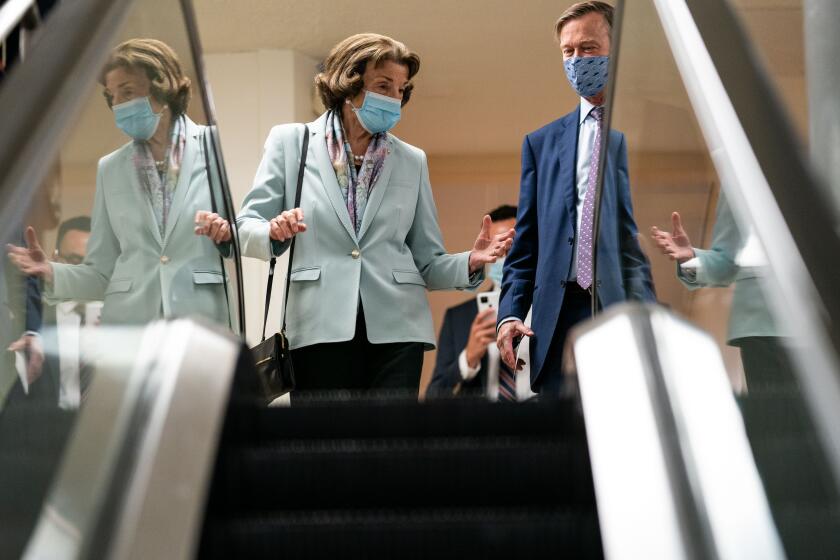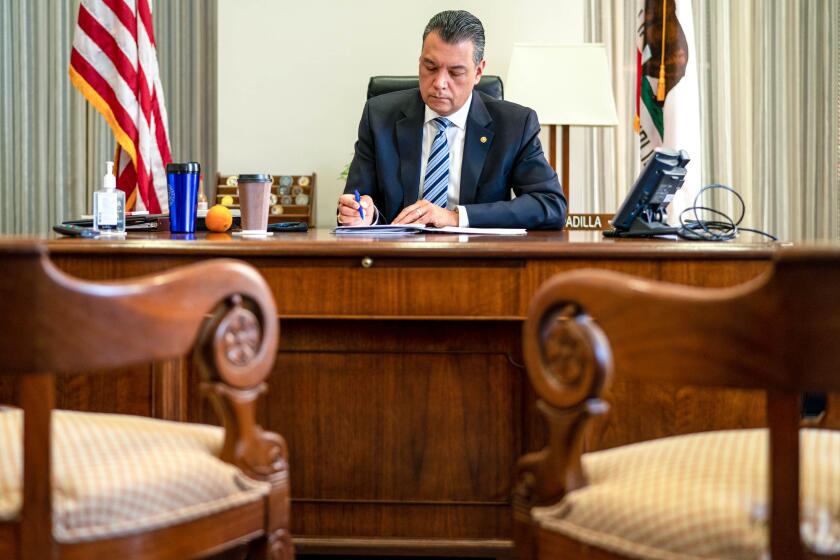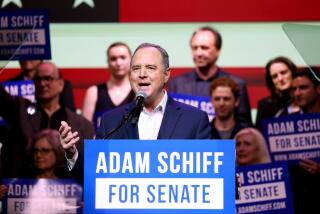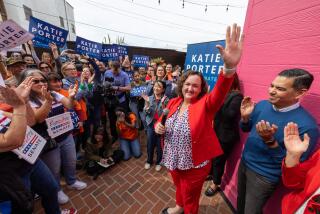Column: Is Dianne Feinstein facing pressure to quit the Senate because she’s a woman? No, she is not
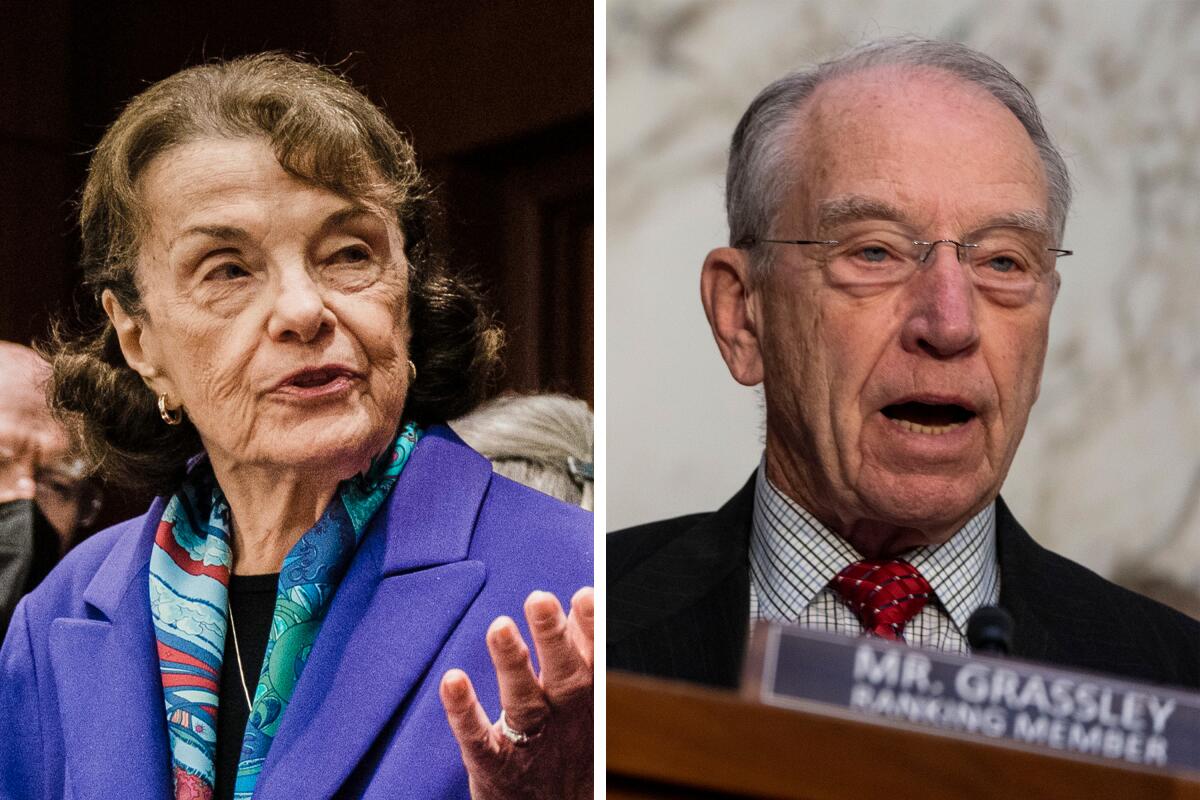
- Share via
When Chuck Grassley was first elected to public office, Dwight Eisenhower was president and Alaska and Hawaii were brand-new states.
After more than 40 years in the Senate — following stints in the Iowa Legislature and three terms in the U.S. House — Grassley is now seeking another six years in office. He is 88 and would be 95 at the end of his term if reelected.
Still, Grassley faces nothing like the pressure being directed at Sen. Dianne Feinstein to stand aside, even though the Iowa Republican is only three months younger than the California Democrat. He seems certain to waltz past his 59-year-old primary opponent in June, and is a solid bet to win reelection in November.
Unlike Feinstein, Grassley also faces no clamor within his party to let someone younger take his place.
On Tuesday, the Senate Democratic leader, New York’s Charles E. Schumer, conspicuously declined when asked by reporters to vouch for Feinstein’s fitness to serve. “I’ve had a good number of discussions with Sen. Feinstein, but I’m keeping them to myself,” said Schumer, who pressed her to surrender the chairmanship of the Judiciary Committee when Democrats took control of the Senate last year.
Is Feinstein facing a double standard because of her gender?
No. She isn’t.
Amid questions about Feinstein’s health and fitness for the Senate, there are also doubts about the alternative.
Although Feinstein still seems capable of doing her job, her mental acuity has visibly declined in recent years. It is no secret the senator relies heavily on her staff — though the same can be said for many lawmakers — and suffers from memory lapses.
By contrast, Grassley “makes a point of seeming as active and vital as ever,” said Dennis Goldford, a decades-long student of Iowa politics who teaches at Des Moines’ Drake University. He recently chatted with Grassley at an Iowa event promoting support for Israel.
(Grassley announced his reelection bid last September in a tweet that read, “It’s 4 a.m. in Iowa so I’m running. I do that 6 days a week.” Included was an image of the senator jogging.)
Karen Kedrowski, an Iowa State expert on women and politics, agreed the elderly incumbent has given voters no obvious reason to question his physical well-being or mental capacity. “There’s been no gossip,” she said, “no whispering about him not being able to do the job.”
On Capitol Hill, Grassley is constantly shadowed by an aide but appears sharp and very much on top of Senate business.
More importantly, he has kept up a long-standing tradition back home, spending summers visiting each of Iowa’s 99 counties.
“If you’re out in the middle of rural Iowa in some county where the population is less than any one of Des Moines’ suburbs, you still feel respected and paid attention to and appreciated because he shows up,” Goldford said. “That means a lot in a state like this.”
Tellingly, Grassley’s opponents have not overtly sought to make age an issue.
His Republican rival, state Sen. Jim Carlin, has instead wrapped himself around former President Trump and echoed his lies about voter fraud and a stolen 2020 election. Democrats have split along their usual lines over which approach — rallying the party’s liberal base or appealing to centrist and potential crossover voters — offers the best chance of unseating Grassley.
His main Democratic challenger, former Rep. Abby Finkenauer, is 33. When she was born, Grassley was already serving his second term in the Senate.
Finkenauer, who served a single term in the House before narrowly losing her 2020 reelection bid, refers only glancingly to the senator’s advanced age. Instead, she speaks of his many decades in Washington, suggesting — in the face of Grassley’s assiduous courtship of even the smallest-town voter — that he has lost touch with Iowa.
That could fall under the category of not belaboring the obvious, though there is little evidence to suggest leaning into the age issue would do her, or any of Grassley’s opponents, much good. If anything, Kedrowski said, it could backfire.
Democrats were heartened last year when a Des Moines Register poll showed 64% of those surveyed said it was “time for someone else” to occupy Grassley’s seat. Fewer than 3 in 10 said they’d support his bid for an eighth term.
However, those sort of surveys, measuring a candidate’s appeal in the abstract, don’t necessarily translate when real-life opponents are matched up. A subsequent poll showed Grassley leading Finkenauer 55% to 37%.
The circumstances were similar when Feinstein prepared to seek reelection in 2018.
An April 2017 poll found more than half of California’s registered voters thought it would be a “bad thing” for her to run again. When reminded of Feinstein’s age, that sentiment grew to 62%.
The next year she was handily elected to a fifth six-year term.
California’s freshman U.S. senator, Alex Padilla, says the last year has meant a lot of adjustment — and a regular 4,600-mile roundtrip commute.
Feinstein appears competent to keep serving in the Senate. Barring clear-cut evidence of incapacity, she deserves to serve out the remainder of her term and, if smart, won’t run again in 2024.
Those pushing her to quit now may be politically pragmatic or ruthless, uncaring or merely unflinching, depending on your perspective. There’s no reason to believe the main impetus is sexism.
The decline and fall of geriatric male senators such as South Carolina’s Strom Thurmond, West Virginia’s Robert Byrd and Mississippi’s Thad Cochran were well-chronicled in their time.
Feinstein may be a target. But she’s not a victim.
More to Read
Get the latest from Mark Z. Barabak
Focusing on politics out West, from the Golden Gate to the U.S. Capitol.
You may occasionally receive promotional content from the Los Angeles Times.

